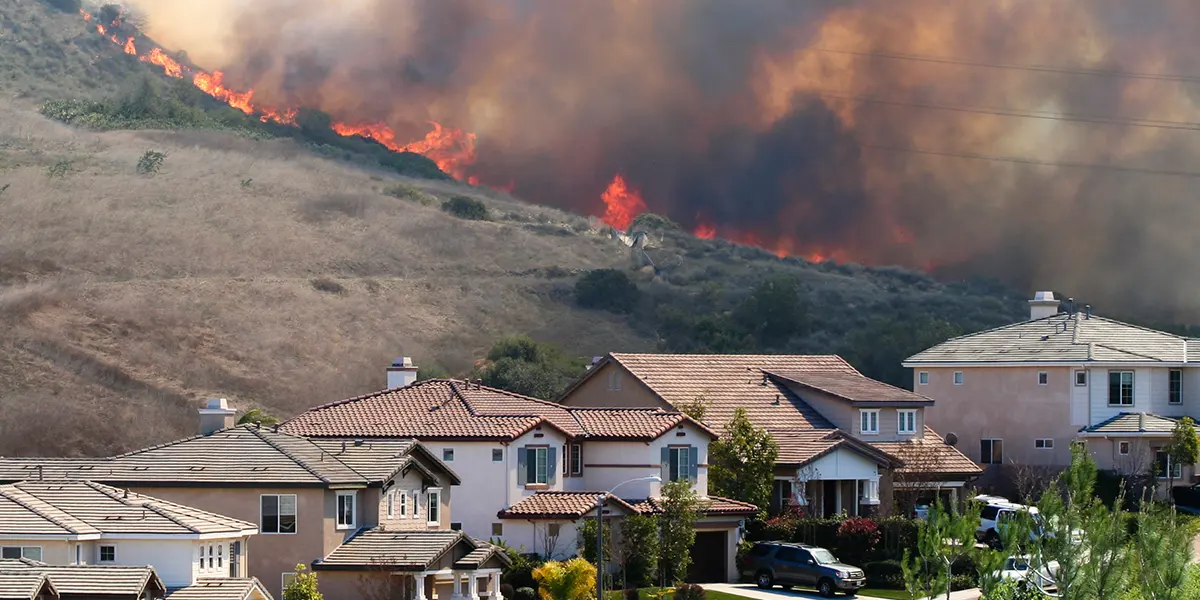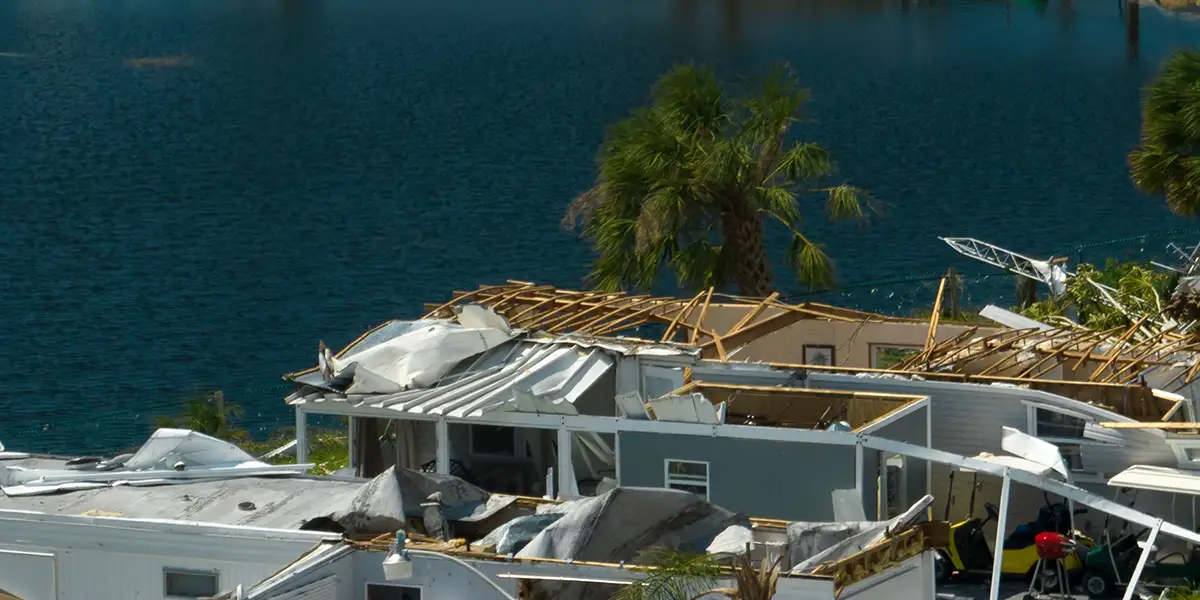Climate change poses a significant threat to the real estate industry in 2023 and beyond. Extreme weather events are forecasted to destroy 167 million homes globally in the next 20 years, making it imperative for the industry to focus on building resilience measures to protect against physical risk. The issue of obsolescence and stranded assets will also become increasingly prevalent, particularly in economically important cities and regions. With no corner of the real estate industry immune to the effects of a warming planet, the industry must prepare for the physical and financial risks of property damage and insurance difficulties. The industry needs to take action and address these risks proactively.
Challenges so far
A sense of urgency across the real estate industry has been invigorated by propelled climate disasters that increasingly demand climate risk to be assessed and factored into new and existing real estate assets and portfolio valuations. For the industry, climate-related risks of hurricanes and secondary peril events of flooding, wildfires and landslides provide new opportunities and additional challenges. Hence, actors across the real estate industry have identified that climate risk is beginning to affect property investors’ decisions - most regarding assets and, to a lesser extent, at the market level. Similarly, from the perspective of the financial services sector, commercial mortgages and insurance companies face the same barriers.
“The first type of climate risk that real estate investors in the US think about is the physical risk - the risk to their asset because of flooding or other extreme weather events,” states Marta Schantz, senior vice president of the ULI Greenprint Center for Building Performance. Property prices decline commonly after natural disaster events but tend to recover quickly. In some cases, commercial owners/investors in some geographies eventually place a higher risk premium on all properties in metro areas affected by climate events, regardless of whether their individual properties have been directly affected. As a result, climate risks are changing how real estate is calculated. Less attention is dedicated to understanding how commercial real estate markets respond to natural disasters, which is surprising for the U.S. given its commercial real estate size, estimated at around $16 trillion in 2018. Of that, approximately 2% of U.S. homes, worth a combined $882bn, are at risk of being inundated by 2100. “There are trillions of dollars in real estate value at stake here ... and there will be winners, and there will be losers,” said Matt Kahn, environmental economics author and professor at the University of Southern California. To mitigate climate risks, many real estate owners and developers adapt by factoring climate risk into business strategies. This comprises mapping physical risks for current portfolios and potential acquisitions, incorporating physical adaptation for assets at risk and climate risk in their due diligence processes. However, real-estate companies that think deeply about how their assets are at risk of climate change for where people live and work and the values and community that matter to them most will have the edge.
What happened in 2022?
The intense and deadly storm surge of Hurricane Ian provided a glimpse into the fact that human-induced climate change is intensifying, with the globe evermore exposed to its adverse impacts. Climate change is warming the ocean’s surface and contributing to increasing atmospheric moisture, from increased rainfalls to fuel hurricanes. Climate change induced the force of Hurricane Ian and increased by 10% more extreme rain than it would have been without GHG emissions. Much of the damage of the weather event had been due to torrential rainfall.
Hurricane Ian's timing was challenging for experts to predict. The hurricane's predicted path fluctuated hundreds of miles as it developed more aggressively towards the coastline, giving less time for people to prepare. Furthermore, the natural disaster showcased the uncomfortable possibility that climate change makes weather events more severe and difficult to predict. While the highest landfall intensity characterised Ian out of the 3 storms, it affected a smaller portion of Florida than Irma. At the same time, it retained significant hurricane status further inland. Hurricane Ian's overall impact differed due to different storm characteristics, structure, interaction with land, and other factors that were difficult to predict.
A series of floods was recorded as one of the nation's worst flood disasters from February to April 2022 in Eastern Australia. More than a year’s rainfall in a week was estimated to have cost $2 billion in residential and commercial damage. The extent of damage caused by the floods dampened the housing supply, with 18,000 homes and businesses affected by the floods, with 10.9% classified as severely damaged and 15.1% classified as moderately damaged and deemed uninhabitable. Property prices have skyrocketed across South East Queensland and Northern NSW over the past year, but those coveted regions have also been the worst hit by recent flooding. Thousands of homes have been lost, temporarily or permanently, and many areas will have to rebuild from the ground up.

Expected regulations in 2023
The EU
- Corporate Sustainability Reporting Directive (CSRD): The CSRD will radically improve the scope and existing reporting requirements of the EU's Non-Financial Reporting Directive (NFRD) that would expand the existing reporting requirements of the Non-Financial Reporting Directive (NFRD) to include the more extensive climate and sustainability considerations.
The U.S.
- The US Securities and Exchange Commission (SEC): These would include climate-related financial impact and expenditure metrics and a discussion of climate-related impacts on financial estimates and assumptions. Such disclosures would also be subject to management’s internal control over financial reporting (ICFR) and an external audit.
Real Estate conferences in 2023
-
RETCON Real Estate Technology Conference
2-4 April 2023 | New York (USA)Over two and a half days, RETCON 2023 will bring together the world’s leading real estate owners, operators and developers to facilitate technology adoption & innovation within the real estate industry. Together, let’s build the future of real estate.
Website: https://retconference.com/usa/
-
MoRe 2.0 Conference
1-3 May 2023 I Dubai (United Arab Emirates)
Witness award-winning thought leaders, innovators, and trendsetters revamp the finance and real estate industry on this global stage.
Website: https://www.more2conf.com/ -
PropTech Vienna
14 June 2023 I Vienna (Austria)
PropTech Vienna brings together the players of digitisation in the real estate industry: PropTechs, decision-makers of the real estate industry, business angels, investors, venture capitalists as well as media and business associations.
Website: https://www.proptechvienna.com/ -
The European Real Estate Society’s Annual Conference
12-15 July 2023 | London (UK)
The ERES Annual Conference is the leading real estate research meeting in Europe and one of the largest property-related conferences worldwide.
Website: https://2023.eres.org/ -
Inman Connect Las Vegas
8-10 August 2023 | Las Vegas, NV (USA)
Inman Connect is the leading residential real estate community event — a 3-day exploration and celebration of the glorious, complicated, rapidly evolving real estate marketplace. It’s where agents, brokers, executives, tech and finance professionals, entrepreneurs and investors gather to learn, share, and forge meaningful relationships. It’s where ideas are nurtured, tribes are found, and careers are built. It’s the place to be — under real estate’s big tent at Inman Connect Las Vegas.
Website: https://events.inman.com/inman-connect-las-vegas
What’s happening next?
European real estate industry respondents are most concerned about the impacts of climate change and are most likely to impact revenue prospects for the next 12–18 months. On top of new concerns about revenue that is prompting real estate leaders to reassess firm strategies. Revenue expectations for 2023 are mixed among those surveyed—40% say revenues should increase, 48% see revenues decreasing, and 12% expect no change. The real estate market is challenging to forecast. In 2022, average house prices across 56 countries and territories increased by 10.2%. But as 2023 commences, housing experts maintain a watchful eye on the economy, which is still being pulled in all directions as beyond the immediate human impact, high inflation, steep interest rates and recession fears; climate change is set to alter the outlook of the real estate industry over the next year. In a world facing more frequent and severe natural disasters, without risk mitigation measures, up to $106 billion worth of coastal property by 2050 will likely be below sea level. To prepare for climate risks, shareholders and lawmakers are increasing the pressure on companies to disclose climate risks facing real estate entities. As new regulation is coming, industry players must be consistent in data and reporting.
Sources
- Jim Clayton, Steven Devaney, Sarah Sayce and Jorn Van de Wetering, The Journal of Portfolio Management Special Real Estate Issue 2021, 47 (10) 75-90; DOI: https://doi.org/10.3905/jpm.2021.1.278
- https://coast.noaa.gov/states/fast-facts/climate-change.html
- https://www2.deloitte.com/content/dam/insights/articles/us175539_cfs_fsi-outlook-commercial-real-estate/DI_CFS_FSI-Outlook-Commercial-real-estate.pdf
- https://www2.deloitte.com/us/en/insights/industry/financial-services/commercial-real-estate-outlook.html
- https://www.efrag.org/Assets/Download?assetUrl=%2Fsites%2Fwebpublishing%2FSiteAssets%2FFinancial%2520Institutions%2520slides.pdf&AspxAutoDetectCookieSupport=1
- https://www.knightfrank.com/research/article/2022-06-06-global-house-price-index-q1-2022
- https://www.nar.realtor/on-common-ground/real-estate-in-a-riskier-climate
- https://www.perenews.com/what-climate-change-means-for-real-estate-real-risk-big-impact/
- https://www.pwc.com/gx/en/asset-management/emerging-trends-real-estate/assets/Emerging%20Trends%20in%20Real%20Estate%20Europe%202023%20Report.pdf
- https://www.qra.qld.gov.au/sites/default/files/2022-07/dae_report_-_south_east_queensland_rainfall_and_flooding_event_-_8_june_2022.pdf
- https://www.realestate.com.au/news/how-australias-flood-crisis-could-impact-property-prices-in-high-demand-regions/
- https://reliefweb.int/report/world/climate-crisis-destroy-167-million-homes-next-20-years
- https://www.reri.org/research/files/RERI_Bond_McCoy_and_McDonough_2022.pdf
- https://www.us.jll.com/en/trends-and-insights/investor/how-regulators-are-tightening-the-screws-on-sustainability-reporting





